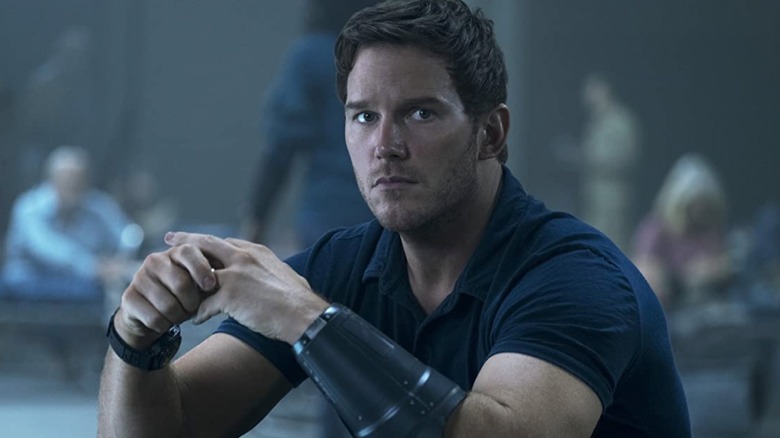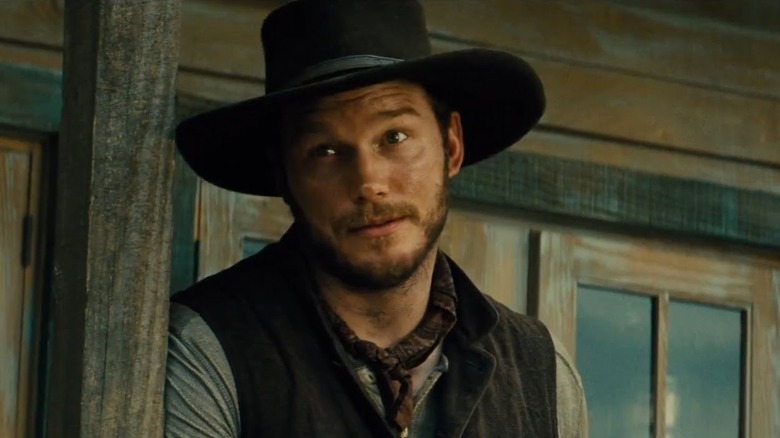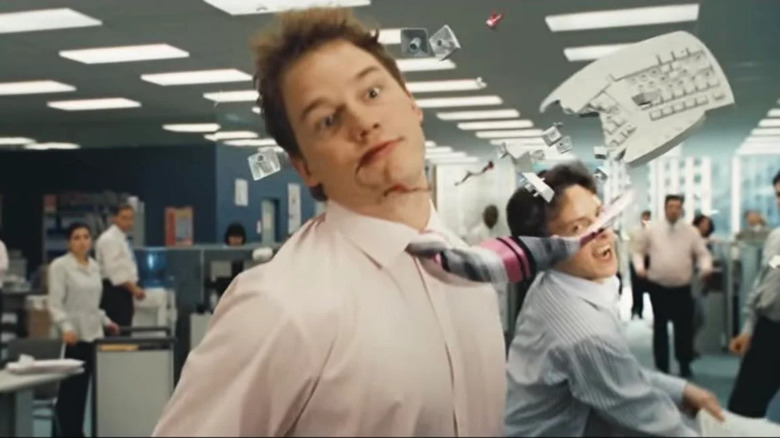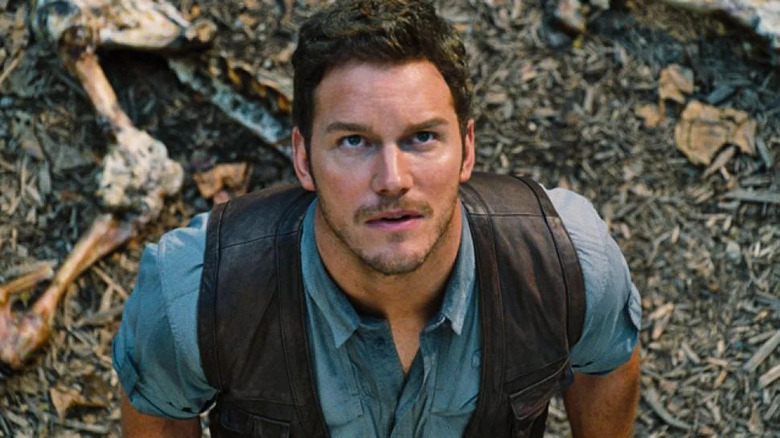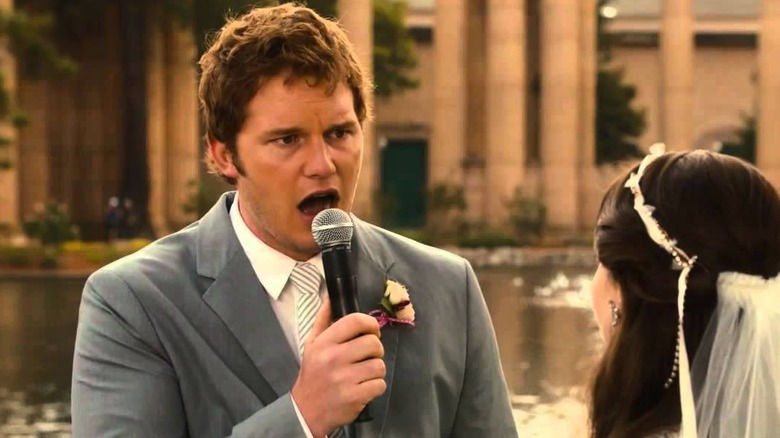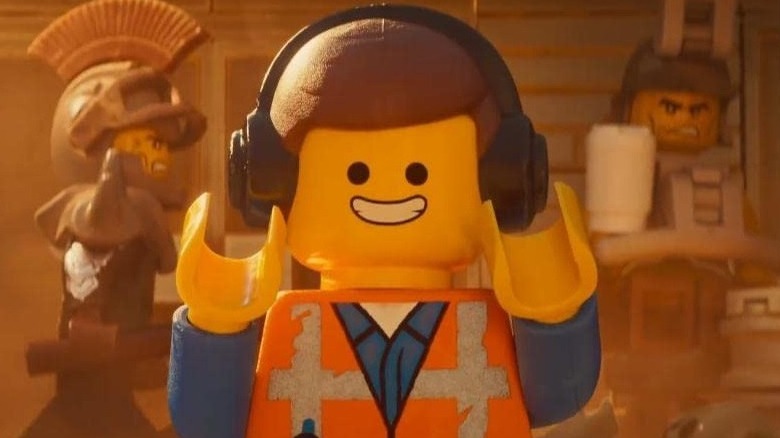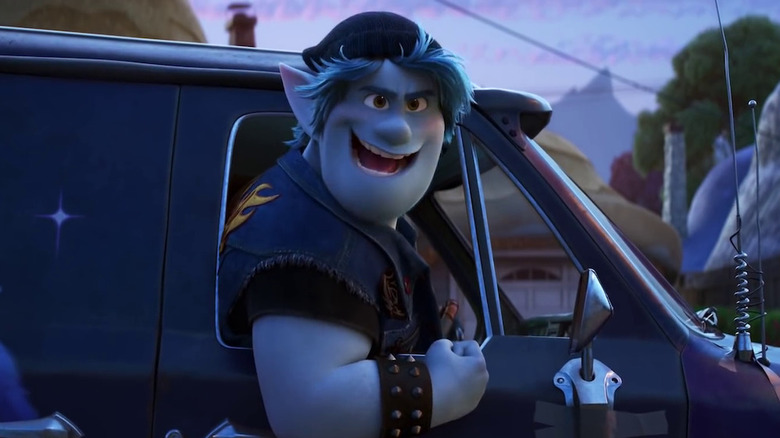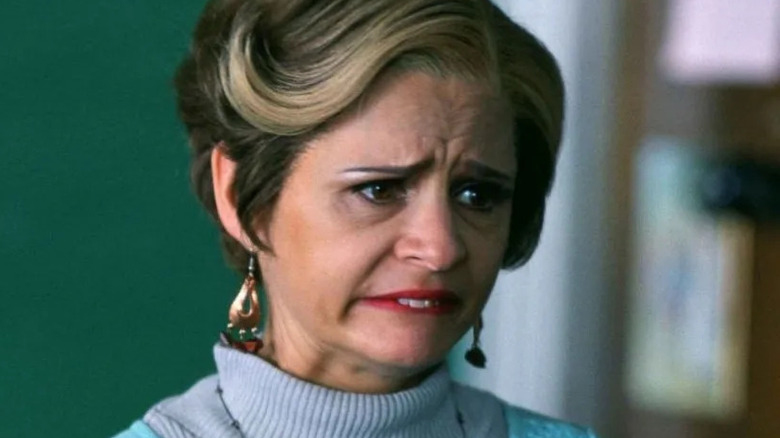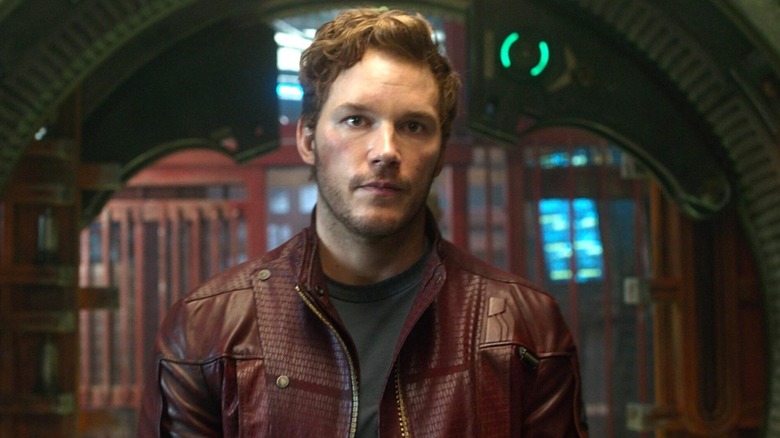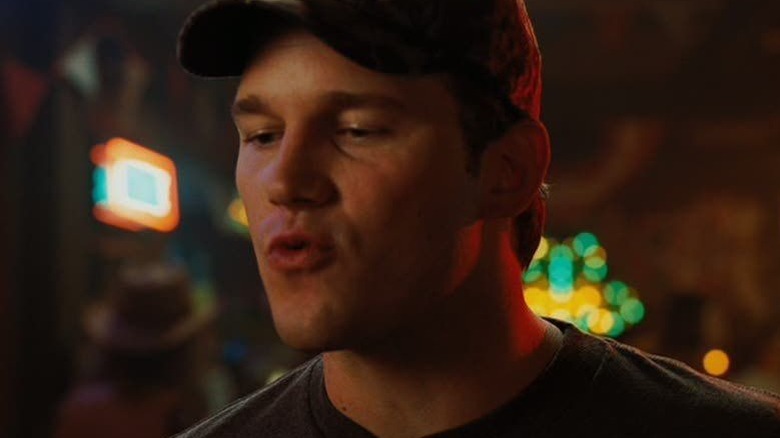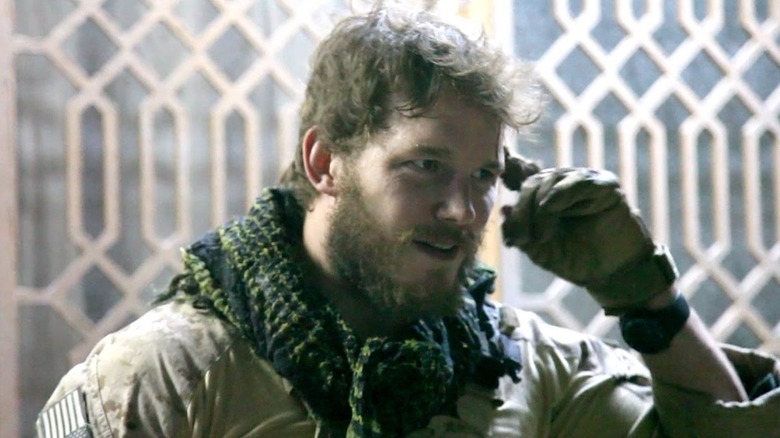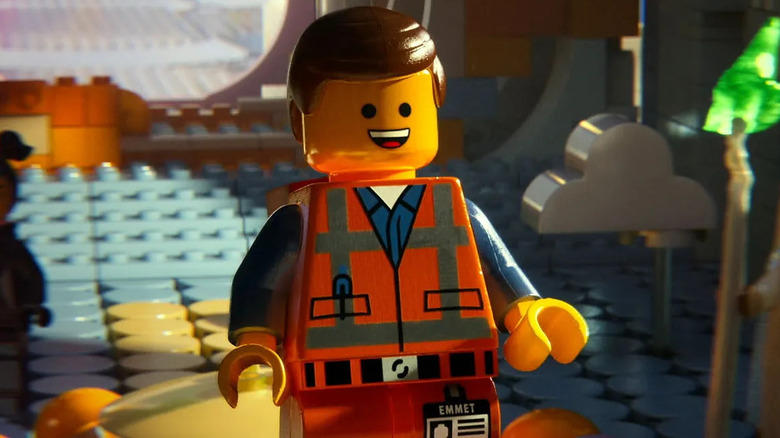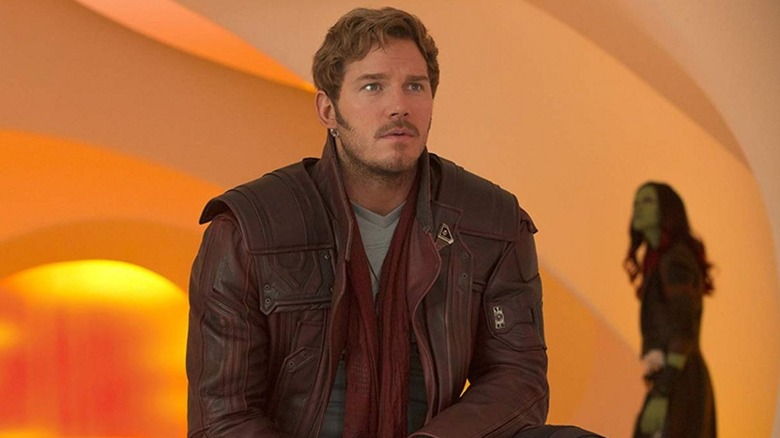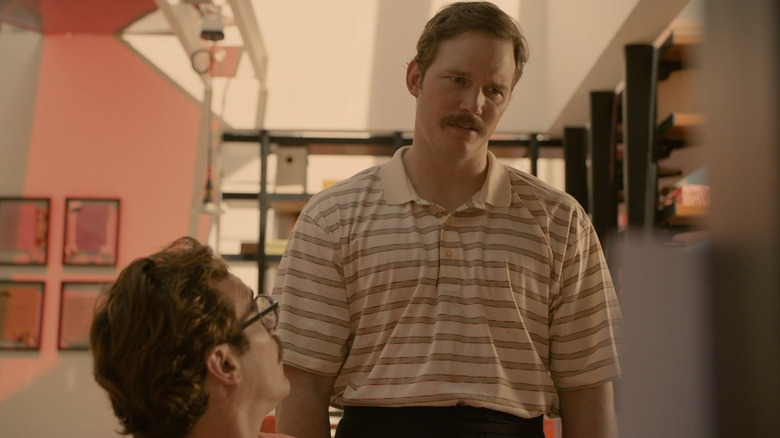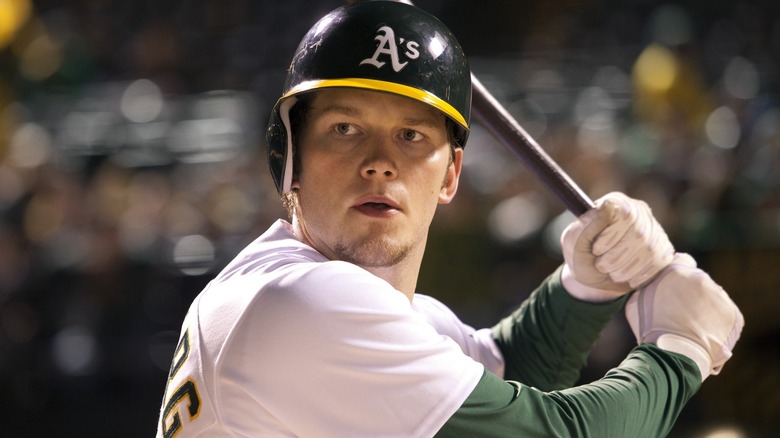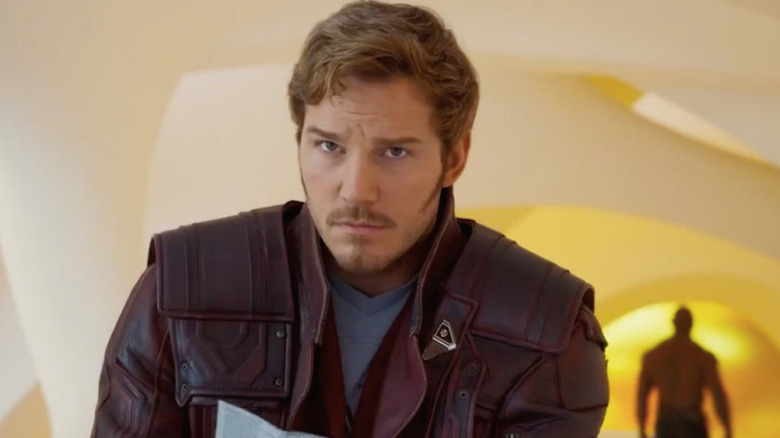The 14 Best Chris Pratt Movies Ranked
Chris Pratt is a man of faith, and, maybe more than any other person on Earth, Chris Pratt is keeping the faith for his pop-culture capital. The 42-year-old Minnesota native has gone from breakout TV star ("Everwood," "Parks and Recreation") to Marvel-machine-made superhero to studio tentpole anchor, weathering backlash and some bad project choices along the way.
What's remarkable about Pratt's career, though, is how many great projects he's contributed to. The man best known for playing Star-Lord has made an indelible mark on indie cinema, worked with game-changing auteurs, and shown the capacity for growth as both a performer and personality. Whatever Pratt's next evolution holds, there's little doubt it will be compelling or surprising. No one expected Pratt as Star-Lord. No one expected a great "Lego Movie." There's a reason Pratt keeps catching audiences off guard and studios continue to place their faith in him; this deep dive into his filmography (and future projects) will suss out why. Here are the 14 best Chris Pratt movies, ranked.
15. The Magnificent Seven (2016)
What if Antoine Fuqua's "The Magnificent Seven" went by any other name? That's the question that ran through my mind when I rewatched the movie. Approaching John Sturges' all-time great Western is a daunting task, like playing a game on maximum difficulty from the jump. Even Denzel Washington can't soften that. But if Fuqua's Western was a blatant rip-off of the original masterpiece under a different name, it would likely be more appreciated. Audiences are quick to forgive, and a tough, charismatic Western starring a murderer's row of brilliant actors gets forgiven its sins pretty quickly.
Besides Washington and Chris Pratt, "The Magnificent Seven" trots out Ethan Hawke as its heavy, plus Vincent D'Onofrio and Lee Byung-hun on hand along with Haley Bennett. If the film doesn't make ideal use of them, it shifts into a satisfying gear when it reaches its climactic shootout, one that stylistically merges Fuqua's whole career into one fiery sequence. Pratt is also in fine form here, channeling more genuine grit than he does in two separate "Jurassic World" movies and making a fine scene partner for Washington, who approaches his Josh Faraday with a mix of incredulity and burgeoning respect. It's not enough to be great, but it's compulsively watchable. That's more than can be said about some Pratt films, so this one makes the bottom of our list with flying colors.
14. Wanted (2008)
There are valid arguments to be made that "Wanted" is willfully misogynistic and toxic to a fault. There are two reasons, though, that it earns a spot on this list. First, as comic book films have become more assembly-line driven, the visual kineticism Timur Bekmambetov unloads throughout "Wanted" has appreciated in value. Bekmambetov was fresh off "Night Watch" and "Day Watch" when he helmed the adaptation of Mark Millar's comic book series, and he arrived chomping at the bit. Teeth are knocked from mouths to briefly spell swear words in slow motion. The curved bullet gunplay is inexplicably cartoony and gory. You might not know whose movie you're watching, but it's undeniably packed with hallmarks.
The other reason "Wanted" is notable is because its most toxic choices are prescient. It is, ostensibly, an ostracized-male fantasy. The protagonist, Wesley (James McAvoy), has no life prospects and complains venomously about his situation. He then finds out his dad was a great assassin and unleashes his "inner caged" lion upon the hordes of those who have been cruel to him. Does this sound darkly familiar? Of course it does. Wesley's journey from zero to hero is conveniently quick, gun-filled, and driven by comeuppance. To him, it feels incredible. Anyone watching can tell you it's sad. Since the release of "Wanted," the world has seen a lot of Wesleys on visible platforms. That makes "Wanted" hard to stomach, but it also makes it feel like essential research.
13. Jurassic World: Fallen Kingdom (2018)
Director Colin Trevorrow's 2015 "Jurassic World" is a disaster; it also made a ton of money. 2018's "Jurassic World: Fallen Kingdom," helmed by J.A. Bayona, was promptly deemed a catastrophe and also made bank, but one of these films is not like the other. Where "Jurassic World" is self-serious to the point of incidental parody, "Fallen Kingdom" is a B-movie free for all. Bayona's made emotionally solvent ghost stories, stirring disaster tales, and metaphor-heavy coming-of-age films. When "Fallen Kingdom" deploys Blue the raptor going full action hero or its clone subplot, it's because Bayona knows exactly what he's going for.
Is it good? That depends on your mileage for gothic silliness and clone subplots. I can't defend all of the storytelling choices in "Fallen Kingdom," but I can tell you almost all of them makes me cackle. There are even moments where it chokes me up, like the sight of a howling brontosaurus consumed by toxic gas as Jurassic Park is destroyed forever. "Fallen Kingdom" isn't as good as "The Last Jedi," but like Rian Johnson's classic, it's bold enough to question and challenge what we want from a "Jurassic Park" franchise film, and then follow the answers to apocalyptic ends. It's too bad Bayona didn't return to direct "Jurassic World Dominion."
12. The Five-Year Engagement (2012)
"The Five-Year Engagement," which chronicles Tom (Jason Segel) and Violet's (Emily Blunt) oft-delayed nuptial ceremony, felt more severe when it was released in 2012. Back then, a global pandemic was either the stuff of dad-novel fiction or the somewhat recent past. Tom and Violet's foibles felt enough to engender their union, and Nicholas Stoller's film gently observed how the moment that makes someone your "till death do us part" person often occurs long before the words, "I do." Now, that's readily clear to many. The COVID-19 pandemic has delayed weddings and caused extended engagements.
This new status quo could render "The Five-Year Engagement" irrelevant; it doesn't. If anything, it's a portrait of what makes Tom and Violet special, and its anarchic refusal to let them wed still feels like a market correction on weddings as an end-all-be-all. "The Five-Year Engagement" is cynical about the wedding celebration complex. It believes, wholesale, in love. And as the primary comedic foil for Jason Segel, Chris Pratt is endearingly silly and chaos-causing. It offers a glimpse of the kind of movie star Pratt might have been if Marvel hadn't come calling. Maybe he'll return to this territory five years from now.
11. The Lego Movie 2: The Second Part (2019)
"The Lego Movie" was a fiendishly clever romp through Warner Bros. IP rooted in solvent emotional territory. The most clever part of "The Lego Movie 2: The Second Part" is its title. That feels harsh, and yet, there's little doubt that the 2019 follow-up to one of the decade's most notable family films offers diminishing returns. "The Second Part" is still rife with sight gags and agreeable energy, but it never becomes more than the sum of its, yes, parts. The animated movie's place on this list has to do with what it means for one Chris Pratt. Pratt is about to go on a mini-run as a major voice actor, having signed on to play both Super Mario and Garfield in upcoming projects. "The Second Part" is an endorsement of these casting decisions.
Pratt returns to voice the eternally optimistic Emmett, but he also plays Rex Dangervest, a character built from every action-movie character Pratt has played in live-action over the last half-decade. There's a lot of Star-Lord. There's a dash of Owen Grady. And Pratt is expected to walk the line between sincere and winking without missing a beat, all while differentiating Rex from Emmett. He accomplishes all of this easily. That's above-average by any measure and an indication we should be quietly excited to see Pratt extend these talents further.
10. Onward (2020)
Disney and Pixar have been cranking out collaborative classics for so long that their good pictures threaten, as the kids say, to be labeled "mid." "Onward," a movie about two elf brothers on a quest to resurrect their dad for 24 hours, isn't one of Pixar's blemish-free efforts, but it's also anything but mid. Its blend of meticulous and creature-filled world-building, frantic comedy, and sudden, gut-punch drama is predictably Pixar but surprising by any other metric. If you somehow missed it, rectify that as soon as possible.
"Onward" also offers an inadvertent referendum on Chris Pratt's star power. The now fitness-forward actor came up playing loveable oafs, most notably Andy Dwyer on "Parks and Recreation," and Barley Lightfoot marks a sort of return to form in that regard. Barley is an obsessive role-playing gamer whose exhaustive knowledge of quests is matched by his difficulty moving through the real world. We see him through Ian's eyes; which is to say we underestimate him right up until the moment Ian realizes Barney has been his father figure all along. Barney is a diamond in a rough of his own making. Pratt made himself appear more diamond-like, but he's still lovingly rough around the edges underneath — someone who understands a misfit heart. In "Onward," that heart shines through.
9. Strangers with Candy (2005)
"Strangers with Candy" doesn't seem like a good fit for Chris Pratt's comedic chops, and I mean that as a compliment to both parties. Pratt elevates a himbo's enthusiasm to high art. At best, his feigned naivete makes him an ideal audience surrogate whether he is or isn't by design, transforming Pratt into a wide-eyed window to the world who's also capable of warping its frame. Jerri Blank (Amy Sedaris) from "Strangers with Candy" is a universe. She's seen it all. She's the odd woman out. Blank catalyzes chaos and gets the regular world onto her wavelength. She and Pratt might as well be oil and water.
Sometimes that makes for great art, though, and there's zero doubt the "Strangers with Candy" movie is that. The rare TV to cinema leap that works, "Strangers with Candy" is directed with flair by Paul Dinello and is every bit as ridiculous, endearing, and colorful as the series with helped launch stars Sedaris and Stephen Colbert. If you've never seen it, it's probably because you don't know the series. Adding both to your viewing queue is a must.
8. Guardians of the Galaxy (2014)
It's worth remembering that there was a time when people were skeptical of "Guardians of the Galaxy." It was a property no one imagined making it to the big screen, featuring Bradley Cooper as a talking raccoon, and starring Chris Pratt playing a super heroic lead. In every sense, Pratt transformed for the role. Pratt's physical shape-up was mirrored by a performance that added new dramatic muscles to his arsenal. "Guardians" is a funny film (the title credits sequence where Pratt dances and dropkicks alien rodents to "Come and Get Your Love" by Redbone may be the MCU's most hysterical moment), but it doesn't work if the moment where Star-Lord notices the holes in Rocket's back whiffs and misses. Pratt is asked to do the heavy lifting and he makes the reps count.
Then again, so does everyone. Zoe Saldana, Dave Bautista, Cooper, and James Gunn all offer revelatory moments in their specific lanes. If Vin Diesel doesn't, it's because he's repurposing one of the most endearing voice-over performances ever. "Guardians of the Galaxy" has minuscule expectations and didn't clear the bar so much as elevate it. That's why it's hard to remember a time when it wasn't beloved, anticipated, and worthy of excitement.
7. Jennifer's Body (2009)
It's easy to forget that Chris Pratt was in "Jennifer's Body" unless you're a super-fan of the film. Come to think of it, it's difficult to remember that "Jennifer's Body," retrospectively, assembled an ensemble of actors who came to embody millennial culture across multiple spectrums. There's Megan Fox, an actress chewed up and spit out by Hollywood in the most misogynistic of ways whose resurgence has brought the 2000s along with it. There's also Oscar-nominee Amanda Seyfried, Adam Brody, and the institution that is J.K. Simmons. Most of all, there is director Karyn Kusama, one of the architects behind 2021's best and most forward-thinking television shows. In short, that's what "Jennifer's Body" is: forward-thinking.
It's not just that Diablo Cody's razor-sharp script is endlessly quotable. It's that the story of a cheerleader named Jennifer (Fox) sacrificed to Satan by a punk band who then becomes a man-devouring demon is as incisive a satire of gender roles as it is a portrait of female friendship. The film cast a star Hollywood still undervalues to this day and it achieves, inexplicably, a balance between comedy and actual horror that most horror comedies struggle to exhibit. "Jennifer's Body" is a blueprint by which to build better movies. It's hard not to be a superfan of it.
6. Zero Dark Thirty (2012)
Movies are inevitable products of their era, and the great ones are usually both timely and timeless. "Zero Dark Thirty" cannot work around this truth, and no one would accuse it of trying to. But the odd conundrum of Kathryn Bigelow's "Zero Dark Thirty," a docudrama about the manhunt for Osama Bin Laden, is that it deliberately aims to be both timely and timeless while chronicling events that were a year old at the time. Bigelow, writer Mark Boal, and the world had experienced the ripple effects of the 9/11 attacks and America's War on Terror for a decade-plus; why not make a motion picture which marries that experience to a century-defining event? The result is a movie that's now dated, but too immaculately crafted to ignore.
The character study of Maya (Jessica Chastain) is subtle but unnervingly specific, her poker faces both stoic and betraying the acclimating weight of the war's cost. The raid sequence (in which Chris Pratt's Justin plays a pivotal role) is still a breathless piece of filmmaking, featuring 30 minutes of hyper-real and nerve-jangling tension. Most affectingly, the climax of this scene — the death of Osama Bin Laden — is both cathartic and not enough. When war is hell and war is every day for a decade, there's little way the pain can truly abate. This is what "Zero Dark Thirty" captures, warts and all. That aspect of it is unflinchingly timeless.
5. The Lego Movie (2014)
Drama therapy is a lesser-known but legitimate therapeutic practice that uses drama and/or theater techniques — including improvisation, role-playing, and using puppets — to achieve breakthroughs in one's life. This also describes the crux of "The Lego Movie." By now, most know about the film's third-act twist: Emmet (Chris Pratt) finds himself in the human world where his life's story is being played through by a flesh and blood, non-Lego boy named Finn (Jadon Sand), who is frequently in conflict with his father, "The Man Upstairs" (Will Ferrell). Ferrell also voices Lord Business, the primary bad guy of "The Lego Movie." This is by design, both for "The Lego Movie" and Finn. Whether Finn realizes it or not, he is using play to try and find peace or make sense of what he's feeling. "The Lego Movie" is on his side.
What's remarkable about this goes beyond the sentiment. "The Lego Movie" backs up its case for the power of play by making its cinematic language as big and exuberant as the proverbial sandbox itself. Characters from DC iconography (Batman, Superman, Green Lantern) are realized through singularly goofy means. Will Arnett's hysterically brooding Batman got his own spin-off, and the visual style blends CGI and live-action with a plethora of stylistic accents. Some moments feel as in tune with '40s noir as they do "One Punch Man." It's therapeutic for one's inner child and cinephile alike.
4. Avengers: Endgame (2019)
It feels cheap, on some level, to pick "Avengers: Endgame" for a Chris Pratt movie list. Pratt barely appears in "Endgame," and his limited screen time partly serves to set up "Thor: Love and Thunder." Yet there's no getting around the truth: "Endgame" is a vastly superior picture to "Avengers: Infinity War," one which transcends the MCU and comic book movie cinema to establish a new high watermark for blockbuster cinema. "Endgame," by accident or not, pushed the summer tentpole into maximalism. If it isn't the maximum amount of characters showing up, it's a plethora of set pieces; overstuffed is the new normal.
This sounds bleak on its surface (and, to be fair, has yielded some dismal movies), but one only needs to look at this year's "Top Gun: Maverick" or "Everything Everywhere All at Once" to see the positive impact of priming audiences for multiversal stories and maximalist blockbusters. The longer the MCU goes on and the more distance we get from "Avengers: Endgame," the more convinced I am it is miraculous. It's an assemblage of corporate IP orchestrated like it's a Tchaikovsky symphony, bombast and subtlety going off in equal measure. There isn't a single moment of it that isn't memorable. It should have been a swan song, but it wasn't. As a result, Hollywood is trying to go bigger, faster, and harder than it. It has no equal.
3. Her (2013)
Joaquin Phoenix has developed a reputation for playing some of Hollywood's most intense characters. He won an Oscar for bringing Arthur Fleck to life in "Joker." Phoenix even made an extreme characterization of himself for the performance art film "I'm Still Here," one that was wildly broad but so lived-in and contingent on Phoenix's erratic reputation that everyone bought it. Conversely, though, Phoenix's most heartbreaking work is more down-to-earth, such as in the stunning "C'mon C'mon." There's also much to be said about his mesmerizing turn in "Her," Spike Jonze's blindingly romantic film about a man who falls in love with AI.
Today, "Her" feels infinitely more possible than it did upon release. Human hearts feel harder for anyone to know the landscape of and connections have been formed through circumstances as crazy as artificial intelligence. The question "Her" asks, beyond its sci-fi trappings, is what it means to be human and how, or if, love factors into that equation. It doesn't arrive at any easy answers, but the fact that it breaks your heart, all the same, is proof that its unknowable elements still land like brilliant sucker punches. The entire ensemble — Chris Pratt included — delivers, but make no mistake that this is Phoenix and Scarlett Johansson's show, and the former lands its hook, line, and sinker. Love is one of the most complex and extreme parts of the human journey. No wonder we needed Phoenix to show us its depths.
2. Moneyball (2011)
"Moneyball" is the best baseball movie ever made, and it's not about baseball. For all intents and purposes, it is about two men — Billy Beane (Brad Pitt) and Peter Brand (Jonah Hill) — whose shift to analytics as the basis for rebuilding the Oakland Athletics changes America's favorite pastime forever. On the front, it succeeds. The trade negotiation scene, which is little more than Beane and Brand on the phone with multiple executives, is the most thrilling writing of Aaron Sorkin's career and a masterclass in how to wring tension and catharsis from the dialogue. It should be studied in film schools everywhere.
But "Moneyball" is also about what baseball can mean. Baseball is the only league with a farm system. It is the only sport that deliberately invests in a player's potential long-term growth and takes time to see if the seeds of talent bear fruit. It's no coincidence that the minor league clubs where this happens are predominantly in small American towns, nor is it a coincidence that the demographics of baseball clubs look more and more like those of America. When baseball changes, it reflects the change in its country. "Moneyball" is about how two men's willingness to evolve causes ripple effects for an entire organization in America. We could all heed its stunning lessons.
1. Guardians of the Galaxy Vol. 2 (2017)
"He may have been your father, boy, but he wasn't your daddy." These 12 words, spoken by Yondu (Michael Rooker) near the end of "Guardians of the Galaxy Vol. 2," are among the most moving in comic book cinema. They're the product of a creator seeing the potential in underutilized characters and telling a personal story through them. That creator is James Gunn, and he makes comic-book movies (their action, stories, and necessary trailer shots) look as easy as breathing.
If 18 years of superhero dominance have taught us anything, it's that it isn't easy. "Guardians of the Galaxy" and its follow-up are among the genre's gold standards because when you're in the throes of them the genre feels limitless and a place for voices to thrive. The comedic voice of Chris Pratt comes through, as does the wounded heart of Nebula (played to the hilt by Karen Gillan). More than that, the primary themes of the MCU shine and become crystallized. Whether you believe the Infinity Saga was planned or not, it became about the family you find and the one you come from. It breaks in favor of the former, and it does so through one of the most lovely moments Gunn has ever staged.
